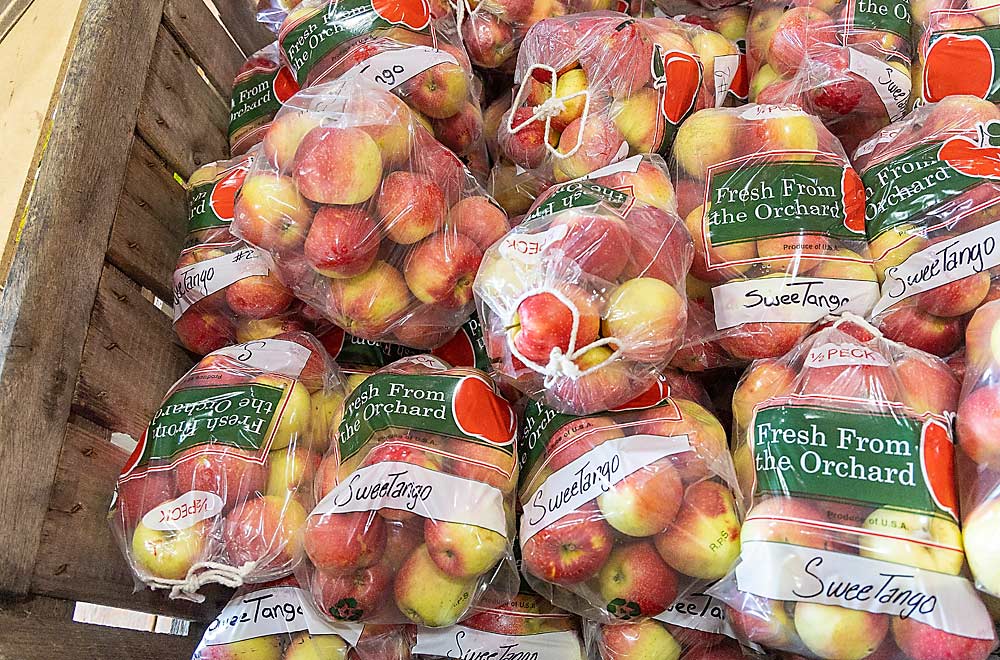
Next Big Thing, the grower cooperative that manages Minneiska, the apple marketed as SweeTango, is partnering with direct farm marketers to boost sales and build greater consumer awareness of its proprietary variety.
Farm marketers and similar direct sales outlets can now sign sublicensing agreements with NBT members. The arrangement allows the direct marketers to buy top-grade SweeTangos directly from NBT growers, then turn around and sell them at their markets. The direct marketers can only sell the apples, not grow them, and must adhere to SweeTango brand standards, said Jennifer Parkhill, NBT’s executive director.
The new sales arrangement illustrates the challenge managed apples face in an increasingly crowded marketplace: How do you boost sales and build consumer awareness when your supply is limited by design?
For Minnesota grower and NBT board member John Jacobson, the solution was always obvious: allow farm markets to sell more SweeTangos. As a direct marketer himself, he understands the power of grassroots consumer movements, and he spent the past few years pushing the NBT board, made up of growers from across the country, to allow direct marketing partnerships.
“Look at Honeycrisp,” Jacobson said. “One of the most highly valued apples in North America right now is an open release from the University of Minnesota. What helped drive that was direct marketers that were able to sell that apple to people, and word of mouth spread.”
In interviews with Good Fruit Grower magazine, no member of NBT suggested SweeTango should become an open release. They still believe the quality and supply control provided by the managed approach will be more profitable in the long run. But SweeTango, one of the oldest and most prominent proprietary apple brands in North America, is fighting for shelf space like every other variety, and it was obvious that something had to give.
Parkhill said SweeTango, which generally harvests in late August or early September, before Honeycrisp, sees pretty brisk sales until other popular varieties start showing up on grocery shelves.
“It becomes a staying power challenge,” she said. “Another variety comes online, SweeTango goes away. That’s frustrating.”
So far, about 20 farm marketers in the Midwest and East have joined NBT’s direct marketing program, Parkhill said. She expects that number to grow.
Michigan grower and NBT board member Mike Wittenbach signed a sublicensing agreement with Robinette’s Apple Haus & Winery, a popular farm market on the outskirts of Grand Rapids.
“With COVID, it’s difficult to do in-store demos anymore,” Wittenbach said. “But farm marketers are the best apple demo people in the industry.”
In the past, Robinette’s had to purchase SweeTangos of a slightly lower grade — perhaps a bit off-color — apples deemed not quite good enough for grocery stores but still good enough to be called SweeTango. But now that the farm market buys directly from Wittenbach Orchards, it can sell top-grade SweeTangos, said president Ed Robinette.
“Farm market sales are how Honeycrisp happened,” Robinette said. “None of us are smart enough to tell what the next hot variety is going to be. But customers are. The crowd can decide.”
Dale Goldy, a Washington state grower and NBT board member, said part of the board’s hesitation over the years was trying to figure out a royalty payment mechanism that would justify the sublicensing agreements. But recognizing the importance of farm markets to building consumer awareness, board members finally worked out the kinks.
“People that go to these direct market operations in fall in general are apple lovers,” Goldy said. “If they eat something they like at a farm market, they’re likely to go to a grocery store and look for it there.”
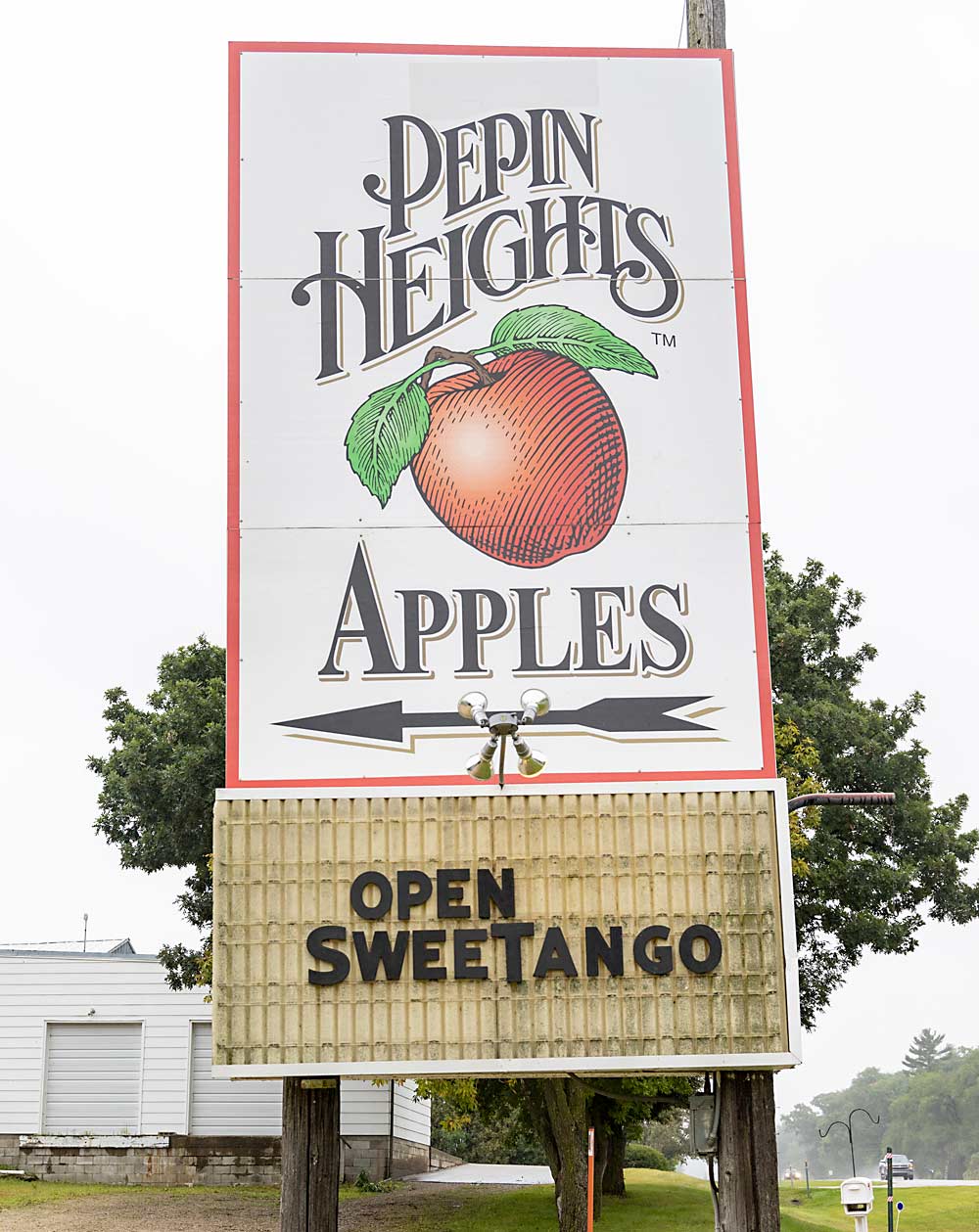
Parkhill said NBT is working on other ways to grow consumer awareness, such as creating more consumer-facing ads and working with social media influencers to gain new followers. She said SweeTango sales are still trending upward, and growing production volumes are expected to gain greater access to retail shelves. More refined horticultural and storage techniques have improved apple quality, too.
“If we can develop our brand, we will move forward and will be OK,” Jacobson said. “We’ll never have the volume of Honeycrisp or Cosmic Crisp, but we have a great apple with world-class taste, texture and juiciness. We just need the grassroots to get people excited about it.”
No home-field advantage
If and when SweeTango does move forward, it probably won’t be in its home state of Minnesota, where a tangled chain of events has given growers little incentive to expand their Minneiska plantings.
When the University of Minnesota released Minneiska in 2006, it granted exclusive SweeTango marketing rights to Dennis Courtier, who owned Pepin Heights Orchards in Lake City, Minnesota, at the time. Pepin Heights formed NBT, which limited the number of orchards that could grow and sell the branded apple in large volumes.
Minnesota growers who weren’t NBT members could only grow a certain number of Minneiska trees and had to sell their SweeTangos directly to consumers or stores. In 2010, about a dozen Minnesota growers sued the university and Pepin Heights, seeking greater access to the potentially lucrative apple. They lost the lawsuit, though the university did grant Minnesota growers greater access to subsequent apple releases, said grower and packer Fred Wescott, one of the plaintiffs.
Courtier sold the SweeTango marketing rights to NBT several years ago, then sold his orchard and retired a few years later. Since then, growers from other states, who have no vested interest in the Minnesota industry, have been steering SweeTango’s future, Wescott said.
Wescott still grows Minneiska trees, but he’s not a member of NBT and he needs the cooperative’s permission if he wants to ship SweeTangos to a retail warehouse — permission he said is frequently denied. As a result, he and other Minnesota growers are not expanding their Minneiska plantings.
“They’re being taken out,” Wescott said. “It’s not a growing component of the Minnesota apple industry.”
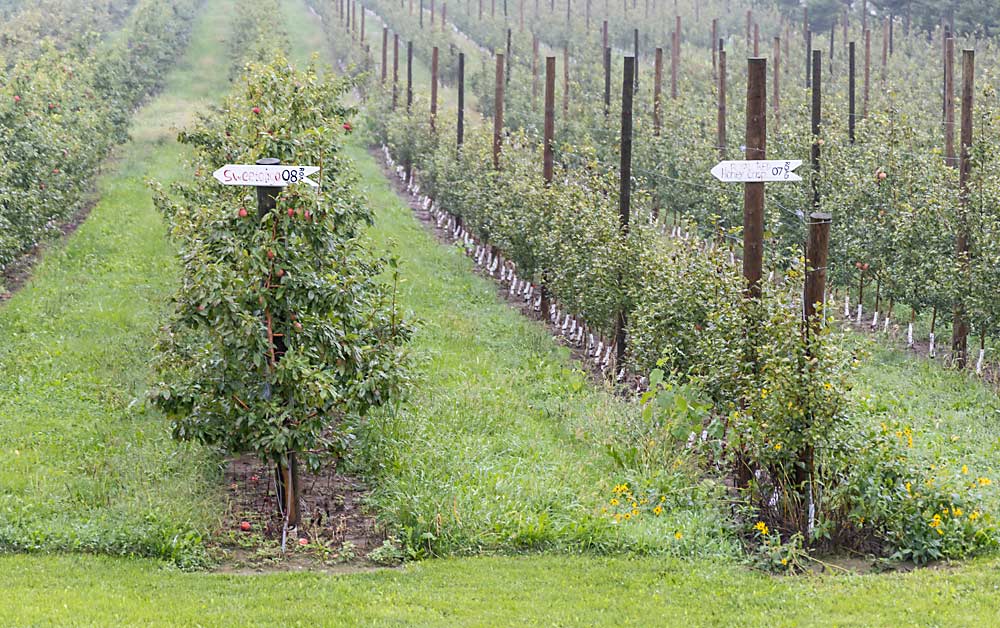
Even the Ferguson family, who bought Pepin Heights in 2018 and has been aggressively replanting ever since, is not planting additional Minneiska trees — even though they’re NBT members and SweeTango is one of the top selling apples in their farm markets, Tom Ferguson said.
Deciding to keep a strict focus on farming, the Fergusons sold the Pepin Heights packing house to Wescott, who originally hoped to use the facility to pack SweeTangos as part of a regional program. NBT didn’t approve of the plan, however, and now Wescott uses the facility to press apple cider, he said.
These days, if the Fergusons want to pack their SweeTangos at an NBT-approved facility, they have to ship them all the way to Michigan. They’ve had other difficulties, too. Hail has destroyed the bulk of their last few Minneiska crops, and most of their Minneiska trees are on Budagovsky 9, a rootstock that has not proven productive in the region. In light of all of these challenges, the family will not be expanding their SweeTango acreage, Ferguson said.
—by Matt Milkovich

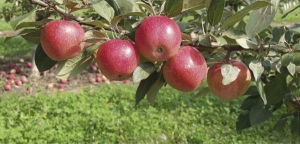
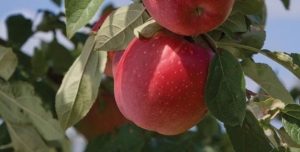





Leave A Comment